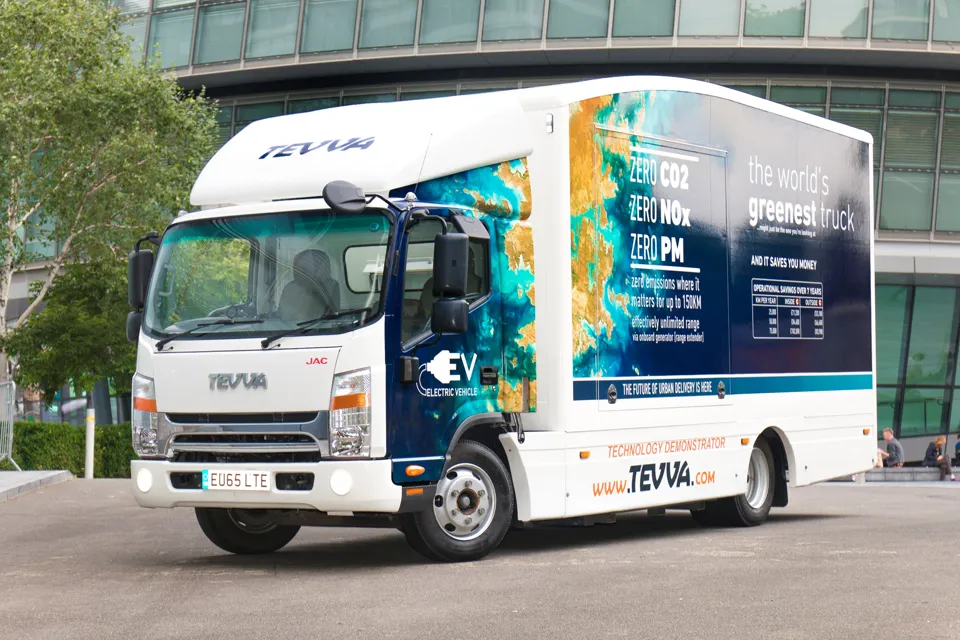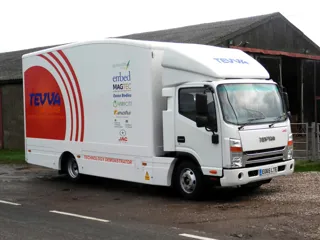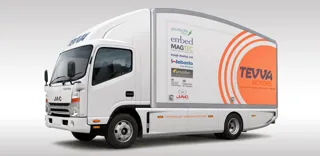Bharat Forge, one of the world’s largest auto industry suppliers, has acquired a 35% stake in electric truck maker Tevva Motors for £10 million.
The deal is part of wider round of funding, which has seen £11.8m injected into the Chelmsford-based manufacturer.
Tevva chief executive officer and founder Asher Bennett told Commercial Fleet he believes the multi-million pound deal will provide the company “with a solid platform to grow the business both in the UK and abroad”.
With Bennett confirming that Tevva will deliver 15 7.5-tonne electric trucks to UPS “by the end of the summer”, he says his short- and medium-term goals will be heavily focused on “upscaling current production levels” and building electric range-extending lorries in the 14-to-18-tonne category, the first batch of which he expects to be completed “later in the year”.
He said: “Not only will the money enable us to double the size of our factory and the size of our team, it will provide us with the launch-pad to develop next generation technology for the UK commercial vehicle sector, and in new geographies too such as China and India, where the government wants to introduce zero emission vehicles by 2030.”
Bennett was keen to stress the wider benefits of the partnership, which he says will provide Tevva with a unique opportunity “to collaborate with Bharat Forge, one of the largest names in global truck manufacturing”.
The agreement will give Bharat Forge a commercial licence to use the Tevva technology within India where it is based.
It will also enable Tevva to grow its R&D capability both in India and at home.
“I think this presents a learning opportunity for skilled engineers from both companies,” said Bennett.
“We’ll host Indian engineers at our factory and vice versa. I believe that this form of information exchange will not just benefit the UK and the Indian automotive industries in the long term, but will ensure we can get our ideas from concept phase to assembly line much more quickly.”
Bharat Forge has already put in place a dedicated team for the EV business and acquired a 45% stake in an Indian start-up focused on electric two-wheelers.
The investment in Tevva will be another step in building the EV supply chain business.
Furthermore, the investment will enable Tevva’s software developers to produce a next generation version of its Predictive Range Extender Management System (PREMS), and advance the electric motor and battery cell technology.
Bennett, says of the PREMS technology, which allows back-to-base fleets to autonomously plot their routes so they can always deploy the electric battery in zero-emission zones: “The combination of new battery cell technology, coupled with a leading-edge range extender and electric motor will lower costs and drive much greater efficiencies than is currently possible.
“Secondly, the range extender will work with myriad alternative fuels including glycerol natural gas and petrol, which will mean the technology we are developing will be accessible to more fleets.”
Bennett also revealed that Tevva is keen to corner the larger electric truck market to produce heavy goods vehicles.
“I cannot say too much at this point, but next year we are aiming to produce a 40-tonne truck, which will have a range of 500 miles,” he said.
“While this would be an evolutionary development for electric trucks, it is important to add that we are still focusing our efforts on back-to-base fleets, but a truck with this range would certainly extend current reach.”
With Tevva’s order book growing month on month – it has secured large orders from eight major customers and has won many smaller orders from SMEs – Bennett says that “as well as building new vehicles”, it will “continue to provide a retrofit option to its customers”, and has “developed a range of innovative leasing models to entice new customers”.
He continued: “We are also releasing an option whereby fleet owners can rent the trucks for six months, meaning that they can take a lower risk approach to learning about the technology.
“Rather than us telling them about the benefits, we want to provide them with a real-world picture, and show them that our vehicles will solve their range anxiety challenges, deliver massive fuel savings and can be seamlessly integrated into their fleets.”




















Login to comment
Comments
No comments have been made yet.